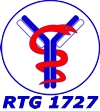TP B4: Organotropism of anti-CXCR3/4- and anti-ETAR/-AT1R-mediated leukocyte migration in inflammatory disease
Interactions between G protein-coupled receptors (GPCR) and their endogenous ligands orchestrate a myriad of cellular events, among them cell trafficking and migration. Further, altered expression of GPCR and their ligands has been implicated in different autoimmune and inflammatory diseases. Apart from natural ligands, it has recently been shown that autoantibodies targeting GPCR might play a role in inflammatory and autoimmune diseases such as systemic sclerosis (SSc). The aim of this project is to characterize interactions between four distinct GPCR, namely CXCR3, CXCR4, ETAR and AT1R, and autoantibodies directed against these four molecules (i.e. anti-CXCR3/4, anti-ETAR, anti-AT1R) in a murine inflammatory disease model. Based upon previous findings it is assumed that high concentrations of anti-CXCR3 and anti-CXCR4 antibodies act in a protective manner, while high concentrations of anti-ETAR and anti-AT1R aggravate inflammatory mechanisms. Thus, a passive murine model of atherosclerosis (C57BL/6, Apoe-/-, high fat diet) will apply IgG preparations containing autoantibodies directed against CXCR3/4 or anti-ETAR and anti-AT1R from patients with SSc and from healthy controls. In addition, to compare passive and active immunization schemes membrane extracts of CHO cells overexpressing CXCR3/4, ETAR and AT1R will be applied in the same murine model. Using immunohistology and flow cytometric analyses, it will be examined if IgG preparations containing anti-CXCR3/4 or anti-ETAR/-AT1R antibodies or the GPCR themselves are able to modify leukocyte migration into the lung and the spleen in comparison to peripheral blood.

- Projects
- Projects
- TP A1 - B cell metabolism
- TP A2 - Expression profiling based drug design in EBA
- TP A3 -Differential roles and cell type specific effects of IL-17A and IL-17F in EBA
- TP A4 - Anti-laminin 322 mucous membrane pemphigoid
- TP A5 - C5a/C5aR in autoantibody induction
- TP A6 - Effects of immune-complexes with sialylated IgG antibodies...
- TP A7 - The effect of neutrophil extracellular traps (NETs) on human neutrophils in vitro
- TP B1 - Novel pemphigus animal model
- TP B2 - Autoimmunity alters the T cell receptor repertoire ...
- TP B3 - Metabolomics in autoimmunity
- TP B4 - Organotropism of leukocyte migration
- TP B6 - Pathomechanisms in experimental Systemic Sclerosis
- Associated projects
- MD projects
- Associated MD projects
- Concluded projects
- Projects







